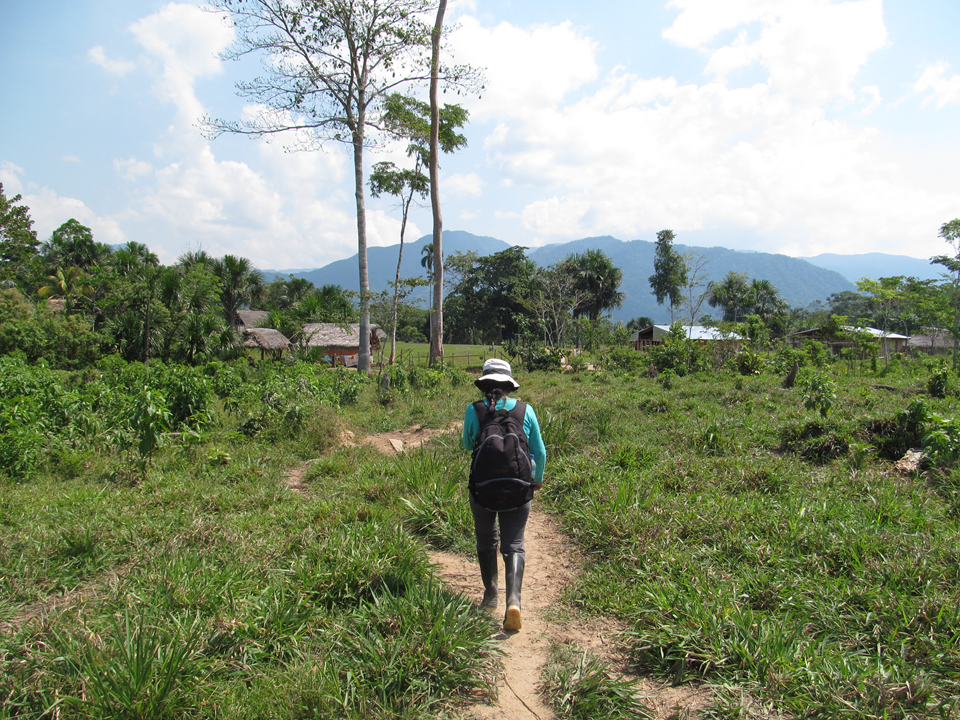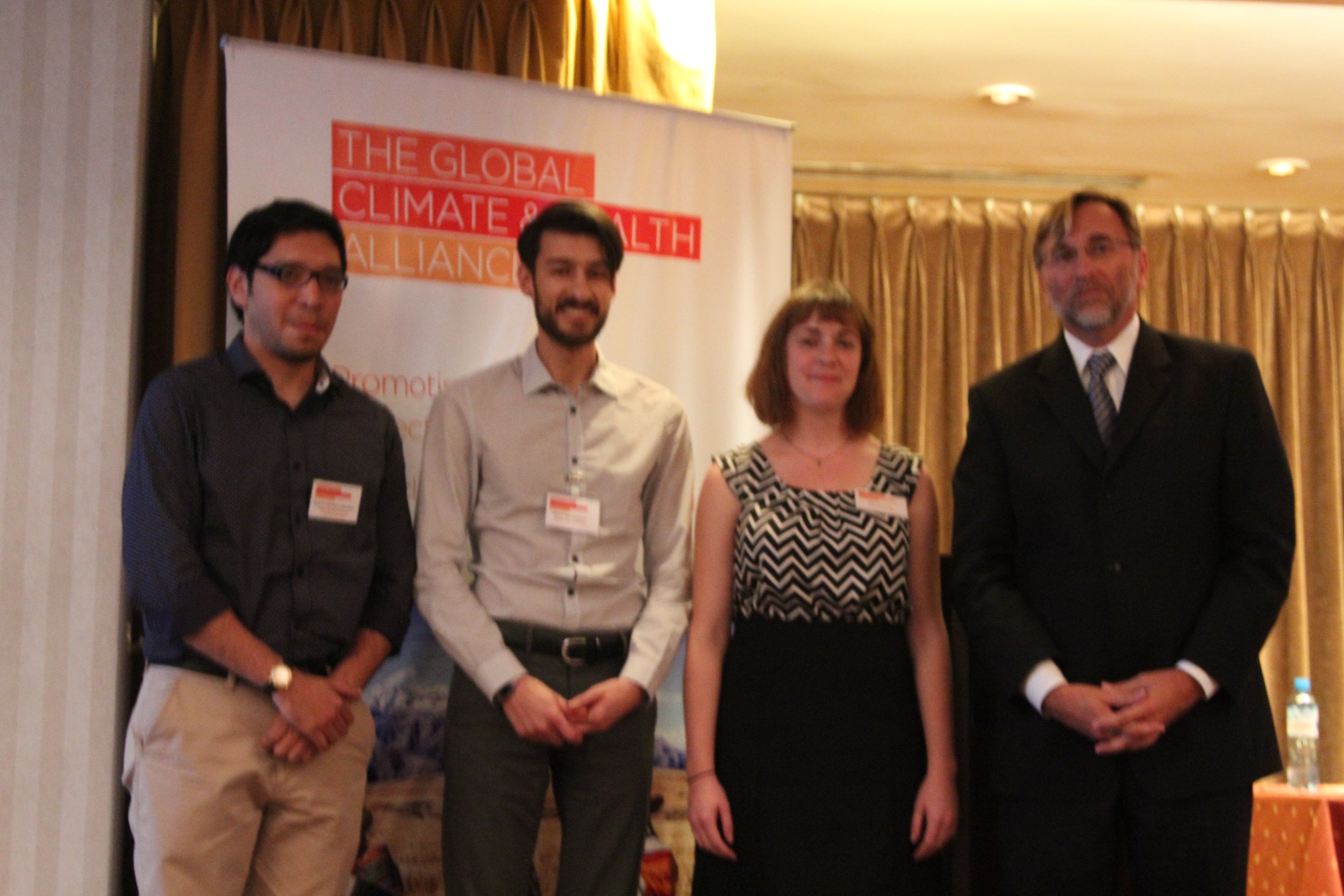Last Tuesday, Rebecca Wolff presented her work as a keynote speaker at the "Sustainability in Designing for a Global Society" event hosted by the University of Guelph's Engineers Without Boarders club. The event was a networking evening focusing on discussions of sustainability and impacts in the global community. The purpose of the evening was to connect students, professors, engineers, scientists, technologists and other professionals to help them build their networks. Rebecca had the opportunity to present her IHACC work on a climate change adaptation case study in the Peruvian Amazon, touching upon water-based health issues.


New article by Mya Sherman et al. in Natural Hazards
A new IHACC research article led by Mya Sherman has been published in Natural Hazards. The article, entitled "Vulnerability and adaptive capacity of community food systems in the Peruvian Amazon: A case study from Panaillo", is based on Mya's Masters' thesis work. To access the article, click here. Abstract:
Rainfall variability and related hydrological disasters are serious threats to agricultural production in developing countries. Since projections of climate change indicate an increase in the frequency and intensity of climatic hazards such as flooding and droughts, it is important to understand communities’ adaptive capacity to extreme hydrological events. This research uses a case study approach to characterize the current vulnerability and adaptive capacity of the food system to hydrological hazards in Panaillo, a flood-prone indigenous community in the Peruvian Amazon. Participatory methods were utilized to examine how biophysical and socioeconomic factors constrain or enable local adaptive capacity to climatic hazards over time. Seasonal flooding was shown to strongly influence agriculture and fishing cycles. Panaillo residents have developed several adaptive strategies to adjust to hydrological extremes, such as food-sharing and the cultivation of fast-growing crops on riverbeds. However, Panaillo residents generally lack the necessary human, physical, social, and natural resources to effectively employ their adaptive mechanisms as a result of major social and environmental changes in the area. Economic development, low institutional capacity, climate variability, and the assimilation social model in Peru all have profound effects on the food system and health by affecting the ways in which adaptive strategies and traditional livelihoods are practiced. Climate change has the potential to exacerbate these socioeconomic and biophysical drivers and further compromise community food systems in the Peruvian Amazon in the future.
IHACC emerging results e-booklets now available for Uganda and Peru
The IHACC emerging results booklets that were prepared for the UNFCCC COP20 last November are now available to read online as e-booklets. Links to the Ugandan and Peruvian results dissemination e-booklets are provided below. The Arctic booklets will be made available on the IHACC website shortly.
Congratulations to Mya Sherman: People's Choice award at the Global Climate & Health Alliance
Mya Sherman's abstract was selected as one of the top 3 abstracts submitted to the Global Climate & Health Alliance research prize, which was part of the Climate and Health Summit in Lima, Peru (December 6th, 2014). She was invited to give an oral presentation on her research work in the Peruvian Amazon. Selected candidates were given the opportunity to have their climate and health research work viewed and critiqued by some of the biggest names in the field. Mya was awarded the Best presentation and People’s choice – best presentation. To read more about the prize, click here. Congratulations Mya!
Mya Sherman to present her work at the Climate and Health Summit, Lima Peru
Mya Sherman will be presenting her Master's thesis work at the 2014 Climate and Health Summit in Lima, Peru on December 6th 2014.
Organized in parallel with the 20th session of the UNFCCC Conference of the Parties (COP 20), the third annual Climate and Health Summit will raise awareness about climate change's negative effects on health and mitigation's potential to create a "cleaner, healthier and more equitable world". The Summit aims to ensure health considerations are included in negotiations toward a 2015 agreement on climate change. The Global Climate and Health Alliance, organizer of the Summit, hopes to galvanize the international health community in advance of the UN General Assembly (UNGA) and COP 21 in 2015. The Summit will exhibit climate change best practices that improve public health. The event will bring together government ministers from health, development, energy and environment departments, other policy makers, technical experts, academics, non-governmental organizations (NGOs) and civil society, medical and health professionals, local health and environment authorities, UN staff and youth.
Date:6 December 2014 Venue:Swissotel, Miraflores, Av. Santo Toribio 173-Via Central, Centro Embresarial Real Via Principal 150, Lima 27 Location:Lima, Peru
read more: http://climate-l.iisd.org/events/2014-climate-and-health-summit/



